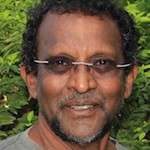Playing With The Future

As the bureaucrats head out once again to negotiate the climate convention, Sri Lanka burns. In a manner fitting of Nero fiddling while Rome burnt, those entrusted with the task of looking after our interests in the climate convention, seem more interested in the ‘bracket brigade’ where endless hours are spent discussing weather to put in or remove brackets in the convention document, rather than informing us of the exact science and innovations that will help us face the oncoming crisis as a nation or by presenting a country position.
A case in point on why the public has to be informed is seen in the National Geographic documentary ‘ Before the flood’ released in last month. The reality of Climate Change is so urgent, that even the US president is suggesting ‘climate refugees’ as a global security threat. The measured trend (fig 1) makes it certain that we will move to a global rise of temperature between 0.5 and 1C. in the next few years.
While the shift of a single degree does not sound much, in individual terms, a one-degree rise in temperature is barely felt on the skin; a one degree rise across the entire surface of the planet means huge changes in climatic extremes. Six thousand years ago when the world was one degree warmer than now, there was pronounced desertification around the planet. In Sri Lanka too, this was the period when the rainforests, which ringed the central mountains, retreated, leaving behind small refugial remnants in the valleys and dry woodland on the hills above. Luckily for us, the reality of two monsoons, kept the dry zone from becoming desertified and we never had to witness the tragedy of dust storms or landscape desiccation. But the current activities of the government seem determined to expose the fragile remnants of our topsoil to desiccation and loss. We are clearing the remnants of the dry zone forests to make way for industrial chemical farming that destroy not only the forests but also the soils of our land. We are loosing both biodiversity and biomass, in a future with a warming climate; regions with low biomass will face the specter of desertification.

It has been calculated that a one-degree increase would eliminate fresh water from a third of the world’s land surface by 2100. This is merely through evaporation. To this must be added the reduction in the volume of clean water by the loss of forests. But Sri Lanka has been endowed a great blessing in this respect. It has a total area of 65,610 km², and on it 11,000 manmade lakes collect and store rainwater in an area adding to about 870 km² in total. Today we destroy this amazing possibility, to utilize this gift of ‘future-proofing’ endowed on us by our ancestors, by mindless ‘development’ projects that cut across watersheds and spew pollutants into our waterways.

